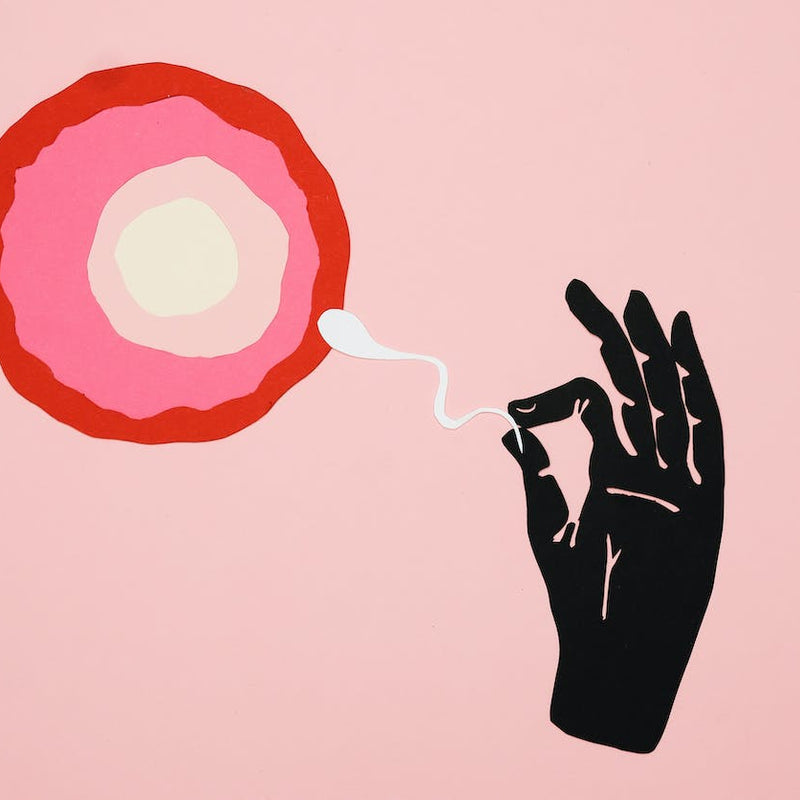Vaginal Dryness During Pregnancy and Breastfeeding

There are a lot of uncomfortable symptoms and bodily changes you may experience during and after pregnancy. Some of these are well-known and frequently discussed, like morning sickness and fatigue, while others tend to go unmentioned, like vaginal discharge. Let’s talk about why you may be experiencing vaginal dryness during or after pregnancy and what you can do about it.
Is Vaginal Dryness Normal During Pregnancy?
It is not uncommon to experience a change in vaginal discharge during pregnancy. [1] In most cases, pregnant people will notice an increase in discharge due to higher levels of estrogen. Higher levels of discharge can also help protect against infections traveling to the womb. [1-2] There may also be a change in the consistency of discharge during pregnancy. Towards the end of the third trimester, some people will start to notice sticky, jelly-like pink mucus. [3] This is the body preparing for birth and is generally not a cause of concern. [3]
Vaginal dryness is less common during pregnancy but is not unheard of. A decrease in discharge may be more noticeable if you’re attempting to or having sex. [2] It’s common for many people to notice a dip in their libido during pregnancy, which can also lead to uncomfortable friction if you aren’t using any lubrication. [2] If sex is ever painful or uncomfortable, stop and let both your provider and partner know. You should also never feel pressured to have sex if you aren’t in the mood. If you are noticing a significant change in your discharge, whether it is an increase or decrease, you should speak with a provider.
Vaginal Dryness Postpartum
Vaginal dryness is much more common during the postpartum period, especially while breastfeeding. [4] This is because there is a dip in estrogen during lactation, leading to decreased discharge and oftentimes, an increase in tenderness and tightness. [4] Other hormones released during lactation, such as prolactin, can also lead to a decrease in libido. With the use of lubricants, vaginal estrogen, and eventual weaning, vaginal dryness is likely to subside. [4]
Causes of Vaginal Dryness
The most likely cause of vaginal dryness in most is low hormone levels. Vaginal dryness is something we often see in those going through perimenopause and menopause when estrogen levels are decreasing. [5] As mentioned already, breastfeeding is also a period of time in which estrogen levels are lower and can lead to vaginal dryness. That being said, there are other causes that may lead to a decrease in vaginal discharge or the thinning, drying, and inflammation of vaginal walls. [5] Some of these include [6-7]:
- Antidepressants
- Antihistamines (common cold/allergy medicine)
- Certain autoimmune conditions, like Sjogren’s syndrome
- Diabetes
- High levels of stress and anxiety
- Dehydration
- Hormone therapy
- Use of scented or perfumed products around the vagina
- Lack of sexual arousal
You should speak with your provider if you are experiencing dryness or irritation. Some infections can also lead to dryness, burning, itching, and other uncomfortable symptoms. It’s important to discover the root of the problem to get prompt and beneficial treatment.
Treating Vaginal Dryness
Vaginal dryness impacts many people in various life stages and isn’t anything to be ashamed of. Sometimes dryness is out of your control and may be related to a hormone imbalance, underlying condition, or medication you’re taking. [7] Whatever the case, you should always speak to a healthcare provider to get personalized treatment options. It’s important to get a provider’s approval before trying any new treatment or management techniques, especially if pregnant or breastfeeding.
Treat Underlying Infections
Certain infections can lead to uncomfortable vaginal symptoms, including dryness, irritation, pain, itching, etc. Speak with your provider about getting tested for sexually transmitted infections, yeast infections, bacterial vaginosis, and other infections. If an infection stays untreated, there can be long-lasting negative effects.
Estrogen
Using prescription medications to replace estrogen levels can be a great way to encourage vaginal lubrication. These medications can be found in a few different forms, including [7]:
- Low-dose estrogen: These come in creams, tablets, or rings that are applied into the vagina using an applicator.
- Ospemifene: An oral selective estrogen modulator (SERM) medication.
- Dehydroepiandrosterone (DHEA): A vaginal suppository
Estrogen and estrogen-like medications may not be right for everyone. For example, Ospemifene (osphena) and DHEA (intrarosa) aren’t options typically used in pregnancy or breastfeeding, and are usually reserved for menopausal patients. Speak with your provider about what treatment is right for you, as well as the benefits and risks of these products.
Lubricant
There are many different types of lube available that can provide relief. Just be sure to use a lube that won’t disrupt the vaginal flora and is safe for use while pregnant, breastfeeding, or TTC. Natalist offers a fertility lube that is water-based, paraben-free, and sperm friendly. Be sure to check with your provider before using any new products.
Stay Hydrated
A lot of water is lost through breast milk when lactating, and the body requires higher amounts of water during pregnancy. It’s extremely important to stay hydrated by drinking plenty of water and electrolytes. Staying hydrated can also help your body retain some moisture, which may improve skin hydration as well as vaginal lubrication. [6-7] Learn more about hydration during pregnancy.
Having Sex During Pregnancy and Postpartum
Sex during pregnancy is considered safe for most people, as long as there are no complications and the pregnancy has not been deemed high-risk. [2] Research shows that there are even some benefits to having sex while pregnant, including boosting intimacy, pain relief, supporting sleep, enhancing mood, and others.
As far as having sex after birth, the timeline may differ for everyone. Most providers recommend waiting at least four to six weeks after giving birth, but for some, sex may not be comfortable for months after delivery. [8]
If you are interested in having sex while pregnant or in the postpartum period, be sure to check with your provider first. If you notice any pain or discomfort, stop and reassess. Read more about intimacy, or shop fertility-friendly lube here.
Dr. Kenosha Gleaton is board certified in gynecology and obstetrics and is the Medical Advisor of Natalist. She received her MD from MUSC and completed her residency at Carolinas Medical Center in Charlotte, NC.
Dr. Gleaton is passionate about women, youth, and mentoring. She is a Scrubs Camp instructor, a program to increase student entry in healthcare, and serves as a Compassion International adoptive parent. She is also a member of the American College of Obstetrics & Gynecology, the American Association of Gynecologic Laparoscopists, and the American Association of Professional Women.
References:
- National Guideline Alliance (UK). Management of symptomatic vaginal discharge in pregnancy: Antenatal care: Evidence review T. London: National Institute for Health and Care Excellence (NICE); 2021 Aug. (NICE Guideline, No. 201.)
- Is it safe to have sex during pregnancy? American College of Obstetricians and Gynecologists. February 2021. https://www.acog.org/womens-health/experts-and-stories/ask-acog/is-it-safe-to-have-sex-during-pregnancy
- Mucus Plug. Cleveland Clinic. July 2021. https://my.clevelandclinic.org/health/symptoms/21606-mucus-plug
- Breastfeeding and Sex. La Leche League International. February 2018. https://llli.org/breastfeeding-info/breastfeeding-and-sex/
- Abraham, Cynthia. Experiencing Vaginal Dryness? Here's What You Need to Know. ACOG. September 2022. https://www.acog.org/womens-health/experts-and-stories/the-latest/experiencing-vaginal-dryness-heres-what-you-need-to-know
- Goncharenko V, Bubnov R, Polivka J Jr, et al. Vaginal dryness: individualised patient profiles, risks and mitigating measures. EPMA J. 2019;10(1):73-79. Published 2019 Mar 2. doi:10.1007/s13167-019-00164-3
- Vaginal Dryness. Cleveland Clinic. July 2022. https://my.clevelandclinic.org/health/symptoms/21027-vaginal-dryness#possible-causes
- Sex after pregnancy: Set your own timeline. Mayo Clinic. December 2022. https://www.mayoclinic.org/healthy-lifestyle/labor-and-delivery/in-depth/sex-after-pregnancy/art-20045669
Reach Out, We're Here
Have questions about your order or products? For the speediest answer, check out our FAQ section. Need something else? Come find us below.
Please keep in mind our regular business hours; Monday-Friday, 9am-5pm CT.
Customer Support
support@natalist.com
Press Inquiries
media@everlyhealth.com
Business & Partnerships
team@natalist.com
Affiliates + Influencers
team@natalist.com
Job Openings
Careers Page






















